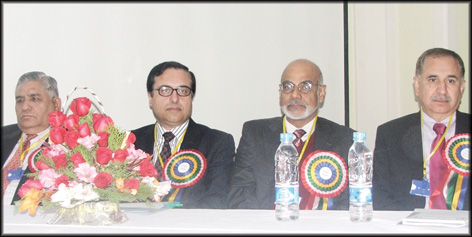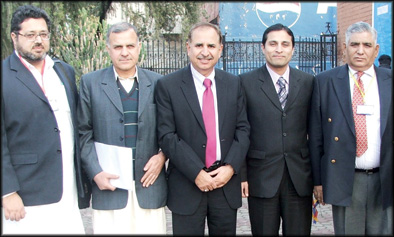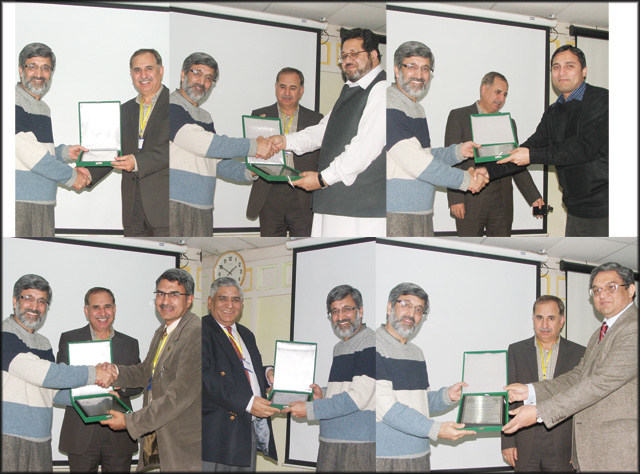From our
correspondent
PESHAWAR: Professionalism, Transparency in working and Functional
Editorial Boards, experienced reviewers can help reduce pressure on
the medical editors. This was stated by Prof. Arshad Javed Chief
Editor of Journal of Postgraduate Medical Institute who is also
Chief Executive of PGMI/Lady Reading Hospital Peshawar. He was
speaking at the National Conference on Medical Publications held at
PGMI from January 7-8th 2012 as a part of Silver Jubilee
Celebrations of JPMI. The conference was organized by JPMI in
collaboration with Pakistan Association of Medical Editors (PAME)
which attracted a large number of postgraduates, academicians
interested in medical journalism. Prof. Noorul Iman Special
Secretary Health, Government of Khyber PK was the chief guest in the
inaugural session while Prof. Hafeezullah Khan Vice Chancellor
Khyber Medial University was the chief guest in the concluding
session.

Journal of
Postgraduate Medical Institute PGMI Peshawar in
collaboration with Pakistan Association of Medical Editors (PAME)
organized a national conference on medical publications to
celebrate Silver Jubilee of JPMI recently. Picture taken on
this occasion shows sitting on the dais from (L to R) Mr.
Shaukat Ali Jawaid Secretary General EMAME, Prof.Nurul Iman
Special Secretary Health Khyber PK, Prof.Azmat and Prof.
Arshad Javed Chief Executive of PGMI.
The conference proved
to be a great success which was evident from the fact that there
were over one hundred seventy participants on the first day where as
the number of participants on second Day which was Sunday were over
fifty which is no less than a miracle. It also proved the fact that
if head of the institution is interested in academics, a lot can be
accomplished to help improve the academics and promote research
culture in our institutons. While credit for this successful
academic event goes to Prof. Arshad Javed
Chief Executive of PGMI but it was Dr. M. Irfan Editor of Pakistan
Journal of Psychiatric Society who is also involved with the JPMI
which has emerged as the rising star in the field of medical
journalism in this province. Prof.Akhtar Sherin President of PAME
who is currently affiliated with medical journal published from
Kohat and had also remained associated with JPMI also played a vital
role in the success of the conference.

During
the national conference on medical publication held at
PGMI/Lady Reading Hospital recently picture shows from (L
to R) Dr. Akhtar Sherin President PAME, Prof. Fazal Ghani,
Prof. Arshad Javed Chief Executive PGMI, Dr. Irfan and Mr.
Shaukat Ali Jawaid Secretary General EMAME.
The organizers had
finalized an excellent scientific programme which consisted of
sessions on Medical Writing, Peer Review and Medical Editing besides
a panel discussion on Highlights of WHO Training Course on Medical
Journal Publishing. Apart from Mr.Shaukat Ali Jawaid Managing Editor
Pakistan Journal of Medical Sciences who is also Secretary General
of Eastern Mediterranean Association of Medical Editors (EMAME)
other invited guest speakers included eminent medical editors like
Prof. Nasir Khokhar Editor Rawal Medical Journal from Islamabad,
Prof. Akhtar Sherin from Kohat, Dr.Ayub Editor Journal of Ayub
Medical College and Pakistan Journal of Physiology from Abbottabad
besides Dr. Usman Ahmad Raza from Global Fund Islamabad. The
organizers also fully utilized the talent available locally hence
speakers were also invited from PGMI and Peshawar Medical College .
Not only that fully exploiting the advantages offered by information
technology, Dr. Irfan had also arranged Tele-Presentations from UK
and Qatar from Prof. Saeed Farooq and Dr. Sajjad Ur Rehman and both
these presentations went well without any interruption.

Prof.
Hafeezullah Khan Vice Chancellor of Khyber Medical University
presenting mementoes to the speakers at the National Conference
on Medical Publications organized by JPMI and PAME at Peshawar
from January 7-8th 2012. Those being presented these mementoes
from (L to R) are Prof. Arshad Javed,
Dr. Akhtar Sherin, Dr. M. Irfan, Dr.M. Ayub, Mr.
Shauakt Ali Jawaid and Dr. Abid Jameel.
Prof. Nurul
Iman in his address highlighted the importance of cordial relations
and good working relationship between the authors, Editors,
reviewers and the readers and it is important that the interests of
all of them is safeguarded. Authors, he said, are rewarded for their
research work and publications by way of promotions. At times the
authors have to rewrite their manuscripts. He advised the PGMI to
take it as a project to have regular workshops on Medical Writing
for the benefit of not only postgraduates but also faculty members.
Editor serves as a link between the author and reviewers and at
times there is delay in publication of manuscripts which is not
liked by the authors. Peer review process needs to be accelerated.
The manuscripts accepted for publication must be readable, memorable
and citable. Now we have many medial colleges in the province of
Khyber PK and some of them have also started their own journals.
They do feel difficulties in editing and journal management. It is
important that these challenges should be converted into
opportunities. Now people are sensitized and they are writing more
and regularly. The environment and the situation have changed. He
hoped that soon JPMI will also get an Impact Factor.
Prof. Azmat Ali Medical Supdt. of Lady Reading Hospital said that he
has been involved with JPMI and has helped it and it was now gone
from strength to strength. We have a plan for the benefit of
trainees. Our FCPS result has also improved a great deal and there
has been a positive change in the PGMI.
Prof. Arshad Javed traced the history of JPMI and said that PGMI was
established in 1984 while the JPMI started its publication in 1986.
He commended the contributions of all the previous editors starting
with Prof. M.Anwar, Hafeezullah, Akhtar Sherin and other. We now
hold the meeting of the Editorial Board every month regularly and
all decisions are taken with consensus. That is why we have never
faced any problem so far. Prof Akhtar Sherin President of PAME in
his speech remarked that as Editors our aim is not to reject the
papers without any reasons but we wish to encourage the authors. We
also request our reviewers to be helpful and give useful guidelines
to improve the quality of the manuscripts to the authors while
reviewing the manuscript. Mr. Shaukat Ali Jawaid gave a brief
introduction of EMAME and pointed out that it currently has 229
members, thirty eight associate members and four honorary members.
EMAME holds its conference every two years in different countries
and runs its affairs under the auspices of WHO EMRO.
Prof. Muzaffar chaired the first session wherein Dr. Fazal acted as
the moderator. Dr. Ayub Editor JAMC was the first speaker who talked
about writing a scientific paper while Mr. Shaukat Ali Jawaid made a
presentation on some useful tips on medial writing. Prof. Fazal
Ghani from Khyber College of Dentistry spoke on how to become a
successful author. He advised the authors to concentrate on original
research which must have some message. They must avoid unethical
research. Fraudulent data and fabricated data besides plagiarism are
other important issues which the authors must avoid and be aware of,
he remarked.
This was followed by an excellent presentation by Dr. Ayesha
Abdullah from Peshawar Medical College on selecting the topic for
research and choosing the correct study design. It was however more
appropriate for a workshop rather than presentation in a seminar.
Dr. Usman Ahmad Raza from Global Fund Islamabad discussed common
graphical and statistical mistakes made by the authors and gave
examples of Mean, Mode and how the data is skewed. P Value means
comparing mean values of two groups. He also talked abut
interpreting p values. Tables should be simple and must convey the
message clearly as stand alone without the reader having to look at
the manuscript. Dr.Irfan discussed how to cite references and gave
various examples while Dr. Akhtar Sherin speaking about publication
ethics said that one must be honest which is the best policy.
Prof. Saddaqat along with Prof. Zafar Iqbal chaired the next session
in which Prof.Saeed Farooq Editor Journal of Pakistan Psychiatric
Society currently living in London talked abut the role of peer
reviewers in improving the quality of the manuscripts through tele
conferencing. He commended the organizers of the conference and
opined that they were the real Talibans who were continuing this
Jihad to improve the academics and promote research culture. Peer
Reviewers, he termed as the Peers of the authors who by helping them
also increase their own Darjats. Reviewing a manuscript he opined,
takes lot of time and to encourage and appreciate their services,
peer reviewers must get some credit for reviewing the manuscripts.
The next presentation by Dr. Sajjad Ur Rehman from Qatar was also
through Tele conferencing and topic of his presentation was on how
to improve peer review system in Pakistan and encourage new
reviewers. He advised the editors to add more contents to their
journals like case reports, evidence based medicine, synopsis to
attract more readers and improve their weakness.
On Day two of the conference, the first session was chaired by Prof.
Mumtaz Khan along with Dr. Fazal Ghani. Dr. Akhtar Sherin discussed
what the editors want from the reviewers. He opined that reviewers
comments should not only help the Editors take a final decision
about accepting or rejecting the manuscript but should also be
helpful to the authors to improve their manuscripts.
The next session was chaired by Mr. Shaukat Ali Jawaid along with
Prof. Nasir Khokhar. Dr. Ayub Editor of
JAMC was the first speaker who discussed at length the problems
faced by the local editors. These are some of the unique problems
consisting of various pressures from the administration, authors,
and professional colleagues. Authors wish to get their manuscripts
published as early as possible irrespective of the quality of their
manuscript. Most authors seldom read and follow the instructions and
then blame the editors for delays in processing. Mr.
Shaukat Ali Jawaid supported Dr.
Ayub and said that authors are known the world over as the most
dangerous pressure groups. Editing a good quality peer reviewed
biomedical journal in a developing country like Pakistan, he further
stated was a very frustrating and stressful job.
Dr. Akhtar Sherin talked abut publication
ethics and felt that the authors must be aware of ethics in
publishing and the consequences of publication misconduct. He
referred to the various flow charts developed by Committee on
Publication Ethics UK to deal with different situations which are
quite helpful for the editors. ICMJE guidelines on Publication
Ethics were another useful source in this regard.
Mr. Shaukat Ali Jawaid in his presentation
discussed at length how to do a peer review of a manuscript and also
highlighted the characteristics of elite reviewers. The final
authority to accept or reject the manuscript, he stated, rests with
the Editor and reviewerís comments, suggestions may or may not be
accepted by the Editor. The reviewers are asked to maintain
confidentiality and give references to support their view point. His
next presentation was on Rights and Responsibilities of Editors.
Prof. Nasir Khokhar in his presentation highlighted the problems
which Rawal Medical Journal was facing and mentioned the low quality
of manuscripts being submitted, lack of good experienced reviewers,
simultaneous submissions to more than one journal and plagiarism.
The journal, he s aid, has now improved a lot with having free
access online edition.
Prof. Arshad Javed Chief Editor of JPMI and Chief Executive of PGMI
highlighted the importance of professionalism in medical journalism
which can help improve the quality of medical journals. At present
most of the editors, he said, are part timers but the situation is
going to improve in the days to come. Now many youngsters are
interestied in this field and Dr. Irfan, Dr.Akhtar Sherin was the
shining examples of this in the province of Khyber PK. Their
capabilities have been well recognized which is evident from the
fact the Dr. Akhtar Sherin has been unanimously elected as President
of Pakistan Association of Medical Editors (PAME). I myself got
stimulated in this field after attending the EMAME conference in
Karachi in 2010.He was of the view that unfortunately PM&DC does not
have any effective criteria for the evaluation of biomedical
journals. On the other hand Higher Education Commission has a well
established transparent criteria of evaluation.HEC has a good
system. Our journals, Prof . Arshad Javed opined, need to increase
their circulation and improve their visibility by having online
editions. JPMI has acquired a new system and this software allows
the authors to make direct online submissions and also track their
manuscripts. Most of the journals publish research articles and
public health issues remain neglected. He again reiterated that
journals must have some system whereby the Editorial Boards should
meet regularly and take decisions which will eliminate pressure on
the editors. Authors get annoyed when some one elseís paper gets
published earlier. If the journal has a transparent system, the
authorís complaints can be addressed effectively. The editors should
also consider delegating some authority to their subordinates so
that authorís queries are responded to without much delay. When we
will have more full time professional editors and more workshops for
authors, reviewers and editors, it will have a positive impact, he
remarked.
In the concluding session there was a panel discussion on Highlights
from the WHO Training Course on Medical Journal Publishing.
Mr.Shaukat Ali Jawaid who along with Dr.Huma Qureshi attended this
course held in Shiraz University of Medical Sciences gave highlights
of the course. He pointed out that every journal must have a Mission
and aims objectives and then evolve a strategy to accomplish that.
Problems of different journals owned by institutons, professional
specialty organizations or private publishers are going to be
different. They will have to be resolved within their resources. A
workshop for Editors of the Journals, will be organized shortly as
per requirements of the WHO, he added.
Prof. Hafeezullah Khan, Vice Chancellor of Khyber Medial University
who was the chief guest in the concluding session in his speech
remarked that we all have on the job training on editing. JPMI had
in the past organized some workshops on medical writing and peer
review. We need to put more focus on improving peer review system.
As a Senior Registrar I had written a small piece in the first issue
of JPMI that research needs recognition. I am glad that after twenty
five years now we have made tremendous progress. JPMI has remained
dependent on PGMI and it has improved its category in the HEC. Now
we will have many more journals published from Khyber PK as we have
also been entrusted the responsibility of publishing Pakistan Heart
Journal. After the affiliation of Kohat Medial Institute with Khyber
Medical University, the KUST journal will also be renamed and it
will also be affiliated with Khyber Medical University. Hence, we
can have regular workshops. KMU, he opined, was also starting
Masters Course in Health Professional Education and Masters in
Health Research which will train professionals which will be
available to help improve the quality of journals, he added. Later
mementoes were presented by Prof.
Hafeezullah and Prof. Arsahd Javed among
the speakers. Prof. Arshad Javed thanked
the guest speakers who came from all over the country to make the
conference a success. He also thanked M/s HighQ Pharma for their
valuable support. He particularly mentioned that they have been very
ethical and did not display any product banner at the meeting venue
and just quietly extended their support sponsoring tea and lunch for
the participants on both days.


